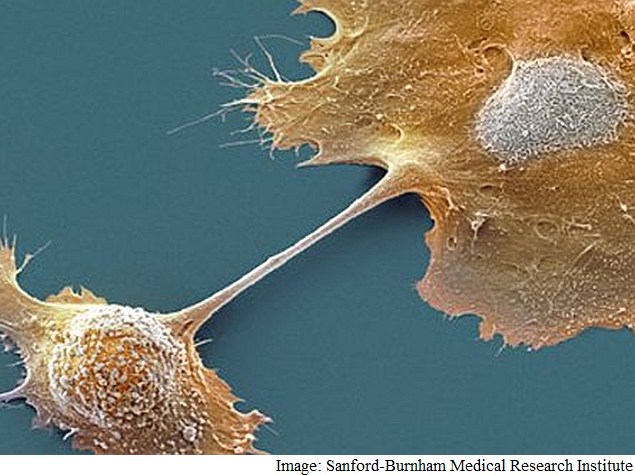- Home
- Science
- Science News
- Scientists Find Way to Restore Pancreatic Cancer Cells to Normal State
Scientists Find Way to Restore Pancreatic Cancer Cells to Normal State
By Indo Asian News Service | Updated: 21 April 2015 17:38 IST

Click Here to Add Gadgets360 As A Trusted Source

Advertisement
Scientists have found a way to restore pancreatic cancer cells to their original state by introducing a protein, thereby offering a potential novel therapeutic approach to combat this highly lethal disease.
"For the first time, we have shown that over-expression of a single gene can reduce the tumour-promoting potential of pancreatic adenocarcinoma cells and reprogramme them toward their original cell type," said Pamela Itkin-Ansari, adjunct professor at Sanford-Burnham Medical Research Institute in the US.
"Thus, pancreatic cancer cells retain a genetic memory which we hope to exploit," Itkin-Ansari said.
The study generated human pancreatic ductal adenocarcinoma cell lines to make higher than normal levels of the protein E47.
The increased amount of E47 caused the pancreatic cancer cells to revert back towards normal cells.
(Also see: Human Trial Shows Promise for Novel Cancer Vaccines)
When the reprogrammed cancer cells were introduced into mice, their ability to form tumours was greatly diminished compared to untreated adenocarcinoma cells.
"Presently, pancreatic adenocarcinoma is treated with cytotoxic agents, yet the average survival for patients post-diagnosis is merely six months, and the improvements in therapies are measured in days," Andrew Lowy, professor of surgery at the University of California San Diego Moores Cancer Center said.
"The finding that we can differentiate these cancer cells back to a non-threatening phenotype is encouraging," Lowy said.
The study appeared in the journal Pancreas.
"For the first time, we have shown that over-expression of a single gene can reduce the tumour-promoting potential of pancreatic adenocarcinoma cells and reprogramme them toward their original cell type," said Pamela Itkin-Ansari, adjunct professor at Sanford-Burnham Medical Research Institute in the US.
"Thus, pancreatic cancer cells retain a genetic memory which we hope to exploit," Itkin-Ansari said.
The study generated human pancreatic ductal adenocarcinoma cell lines to make higher than normal levels of the protein E47.
The increased amount of E47 caused the pancreatic cancer cells to revert back towards normal cells.
(Also see: Human Trial Shows Promise for Novel Cancer Vaccines)
When the reprogrammed cancer cells were introduced into mice, their ability to form tumours was greatly diminished compared to untreated adenocarcinoma cells.
"Presently, pancreatic adenocarcinoma is treated with cytotoxic agents, yet the average survival for patients post-diagnosis is merely six months, and the improvements in therapies are measured in days," Andrew Lowy, professor of surgery at the University of California San Diego Moores Cancer Center said.
"The finding that we can differentiate these cancer cells back to a non-threatening phenotype is encouraging," Lowy said.
The study appeared in the journal Pancreas.
Comments
Catch the latest from the Consumer Electronics Show on Gadgets 360, at our CES 2026 hub.
Related Stories
Popular on Gadgets
- Samsung Galaxy Unpacked 2025
- ChatGPT
- Redmi Note 14 Pro+
- iPhone 16
- Apple Vision Pro
- Oneplus 12
- OnePlus Nord CE 3 Lite 5G
- iPhone 13
- Xiaomi 14 Pro
- Oppo Find N3
- Tecno Spark Go (2023)
- Realme V30
- Best Phones Under 25000
- Samsung Galaxy S24 Series
- Cryptocurrency
- iQoo 12
- Samsung Galaxy S24 Ultra
- Giottus
- Samsung Galaxy Z Flip 5
- Apple 'Scary Fast'
- Housefull 5
- GoPro Hero 12 Black Review
- Invincible Season 2
- JioGlass
- HD Ready TV
- Laptop Under 50000
- Smartwatch Under 10000
- Latest Mobile Phones
- Compare Phones
Latest Gadgets
- Samsung Galaxy A07 5G
- Vivo Y500i
- OnePlus Turbo 6V
- OnePlus Turbo 6
- Itel Zeno 20 Max
- OPPO Reno 15 Pro Mini 5G
- Poco M8 Pro 5G
- Motorola Signature
- Lenovo Yoga Slim 7x (2025)
- Lenovo Yoga Slim 7a
- Realme Pad 3
- OPPO Pad Air 5
- Garmin Quatix 8 Pro
- NoiseFit Pro 6R
- Haier H5E Series
- Acerpure Nitro Z Series 100-inch QLED TV
- Asus ROG Ally
- Nintendo Switch Lite
- Haier 1.6 Ton 5 Star Inverter Split AC (HSU19G-MZAID5BN-INV)
- Haier 1.6 Ton 5 Star Inverter Split AC (HSU19G-MZAIM5BN-INV)
© Copyright Red Pixels Ventures Limited 2026. All rights reserved.

















